It’s now the final month of 2021 and, as is the case every year, one can see some of the theatrical offerings are a bit all over the place. Some of last month’s selections will be available to a wider audience this month (namely Licorice Pizza and The Power of the Dog), some below won’t actually get wider releases until next month, and others (The Worst Person in the World, Petite Maman, A Hero, and Cyrano, to name a few) are getting one-week, awards-qualifying releases, making them 2021 films despite not receiving proper releases until 2022. Nonetheless, there’s still plenty to check out this month and you can see our top picks below.
15. The Scary of Sixty-First (Dasha Nekrasova; Dec. 2 in theaters and Dec. 24 on VOD)
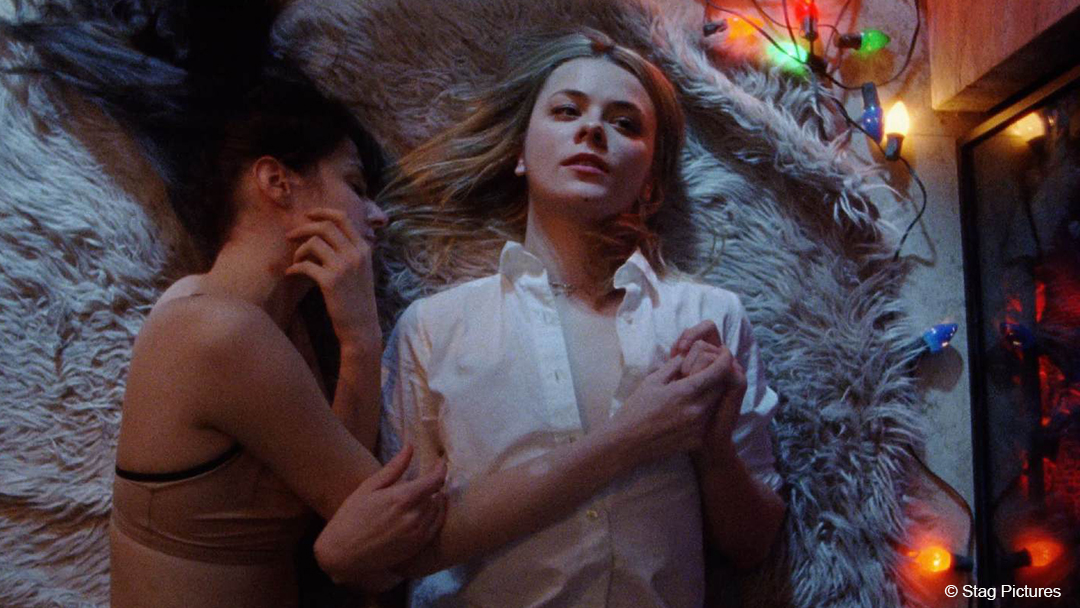
Well-timed to her current run in Succession, Dasha Nekrasova’s directorial debut The Scary of Sixty-First will arrive this month following a Berlinale premiere in February. Joshua Encinias said in his review, “Scary’s cinematographer Hunter Zimny makes visual references to Polanski’s The Tenant and Kubrick’s definitive “elites are sex monsters” classic Eyes Wide Shut, but even better is his capturing the feeling of being alone with knowledge of tremendous evil in one’s presence. He conveys it with arching gargoyles at Epstein’s home and looming architecture in the neighborhood. Though Epstein is dead, his home and the New York real estate world he left behind continue haunting city dwellers who can barely afford to live in outer boroughs, much less a mansion.”
14. Listening to Kenny G (Penny Lane; Dec. 3 on HBO Max)

Coming off Hail Satan?, Penny Lane has found a much different subject for her next documentary. As Jared Mobarak said in his review, “While the premise of Penny Lane’s Listening to Kenny G unfolds through the comedic question “why do so many people hate Kenny G?” it quickly reveals itself a rather intriguing tightrope walk upon the line separating art from commerce. Because this question cannot be answered without first acknowledging who the “people” are. Kenny G has fans. A lot of them. He’s sold 75 million records to become the best-selling instrumentalist of all-time. So they aren’t those “people.” Those who enjoy ragging on him as a meme because he’s an easy punching bag aren’t either. The real “haters” are therefore those who take jazz as an artform so seriously that they cannot comprehend Kenny G as anything but a hack. They hate him because he’s ignoring the rules.”
13. Nightmare Alley (Guillermo del Toro; Dec. 17 in theaters)
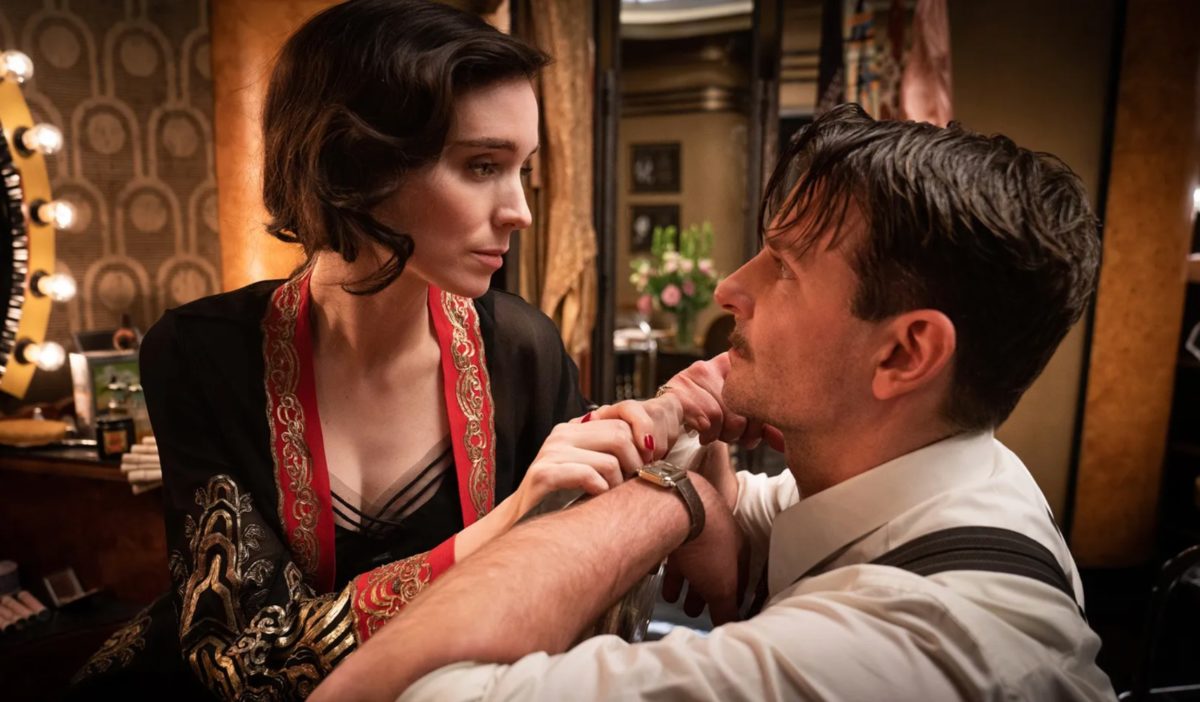
Following up his Best Picture winner The Shape of Water, Guillermo del Toro has assembled another star-studded lineup with Nightmare Alley. Bradley Cooper, Cate Blanchett, Toni Collette, Willem Dafoe, Richard Jenkins, Rooney Mara, Ron Perlman, and David Strathairn lead the adaptation of William Lindsay Gresham’s novel, which was previously brought to the screen in 1947 in a stellar noir (now on Criterion). While trailers have sold a fairly by-the-numbers adaptation, here’s hoping del Toro has a few tricks up his sleeves.
12. Jockey (Clint Bentley; Dec. 29 in theaters)
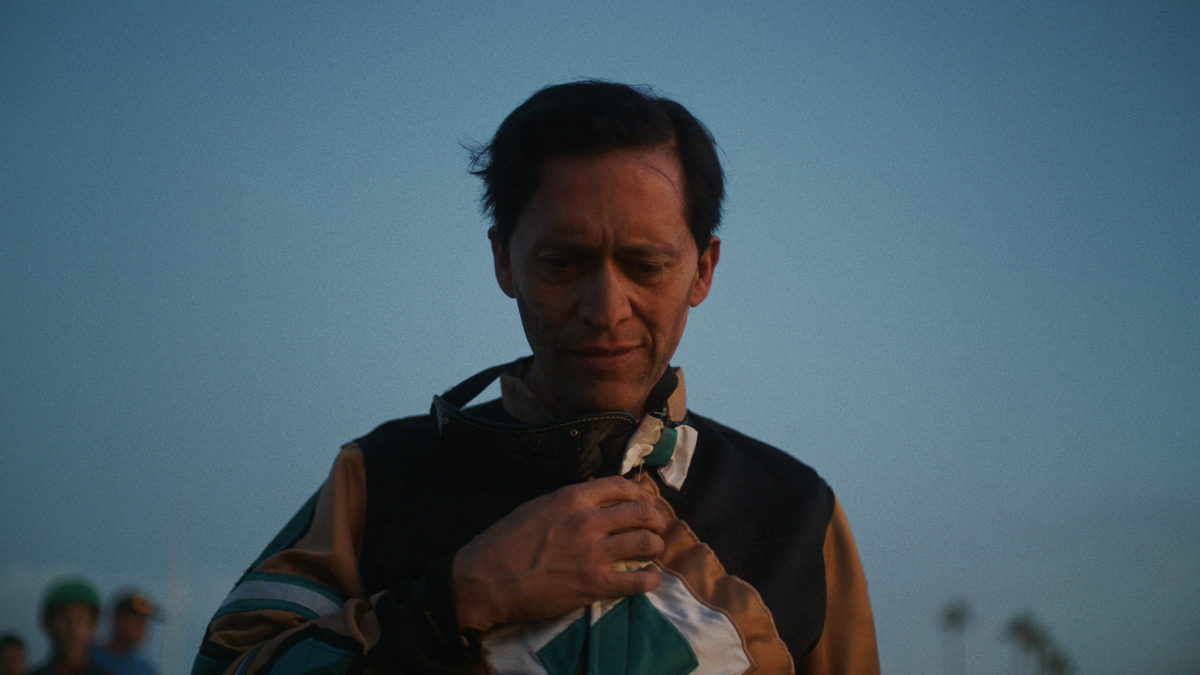
Working since the 1990s, Clifton Collins Jr. has occupied a special space in the character actor realm; now he has a leading role worthy of his talents with Jockey. Per Michael Frank in his review from Sundance, “Clint Bentley’s Jockey sources its strength from its casting. Led by a career-best Clifton Collins Jr. and supported by more-than-solid performances from Molly Parker and Moisés Arias, the film leans on these three actors to tell a tried-and-true story. Bathed in the simmering goldenness of sunrises and sunsets, Jockey looks and feels like a classic sports movie, and a simple story about a man and a horse.”
11. Last and First Men (Jóhann Jóhannsson; Dec. 10 in theaters and at Metrograph digitally)

Jóhann Jóhannsson sadly passed away in 2018, and his final work is now arriving stateside this month. Ed Frankl said in his review, “If any film composer of the last decade defined the period best, it might’ve been Jóhann Jóhannsson, whose synthy, epic tones captured the turbulent, globalized environment of the new century. His work with Denis Villeneuve (Prisoners, Sicario) turned him into a Hollywood name, but the Icelandic instrumentalist was also a musician in his own right who toured the world and released his own records. I’m writing in the past tense, of course, because Jóhannsson died in 2018, though not before he completed his final work, an installation with orchestra combining film and music–with narration by Tilda Swinton–from where this extraordinary cinematic odyssey emerges in its apparently intended final form. Its vision of an apocalyptic extinction inevitably garners interpretations as something of an epitaph to his life and career.”
10. The Tragedy of Macbeth (Joel Coen; Dec. 25 in theaters and on Apple TV+ on Jan. 14)
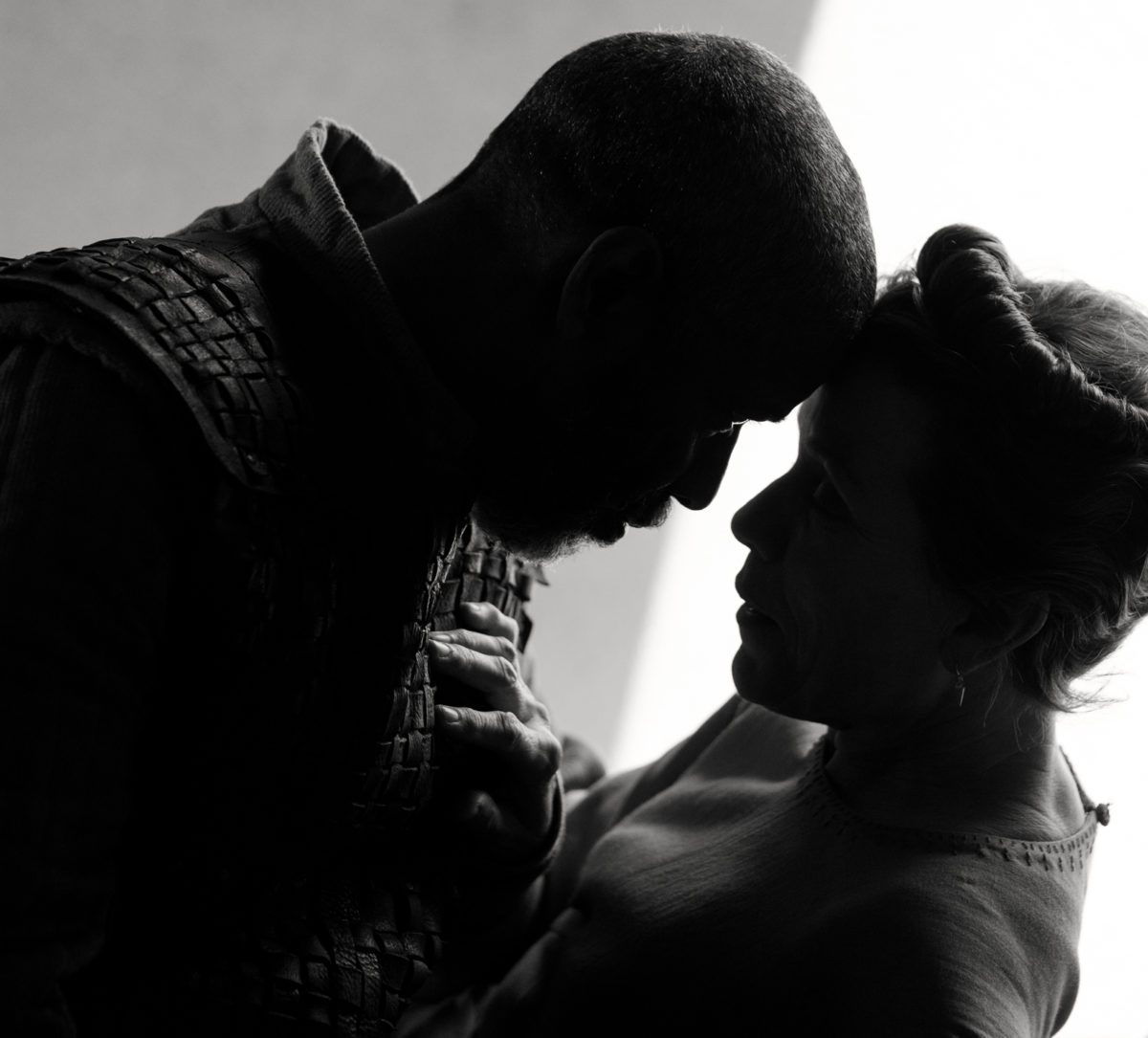
Joel Coen’s first film without his brother is an adaptation of Shakespeare’s iconic tragedy, both nimble yet starkly vivid in its design and featuring all-around stellar performances. Per Jake Kring-Schreifels’s NYFF review, “The first image in Joel Coen’s The Tragedy of Macbeth is of three ravens hovering through foggy and filthy air. Their altitude suggests the camera craning its neck, peering up at the foreboding winged figures circling through the white sky. Or is it really looking down upon them? Moments later, the clouds dissipate to reveal the charred ground beneath, a bird’s-eye view of disorienting perspective. Indeed, like these flying prophets incant the Scottish play’s opening meters, fair is foul, and foul is fair—and within the cloistered halls and barren walls of this lean, stripped-down, resonant adaptation, everything eventually reveals its two-sided nature, its light and its dark.”
9. Parallel Mothers (Pedro Almodóvar; Dec. 24 in theaters)
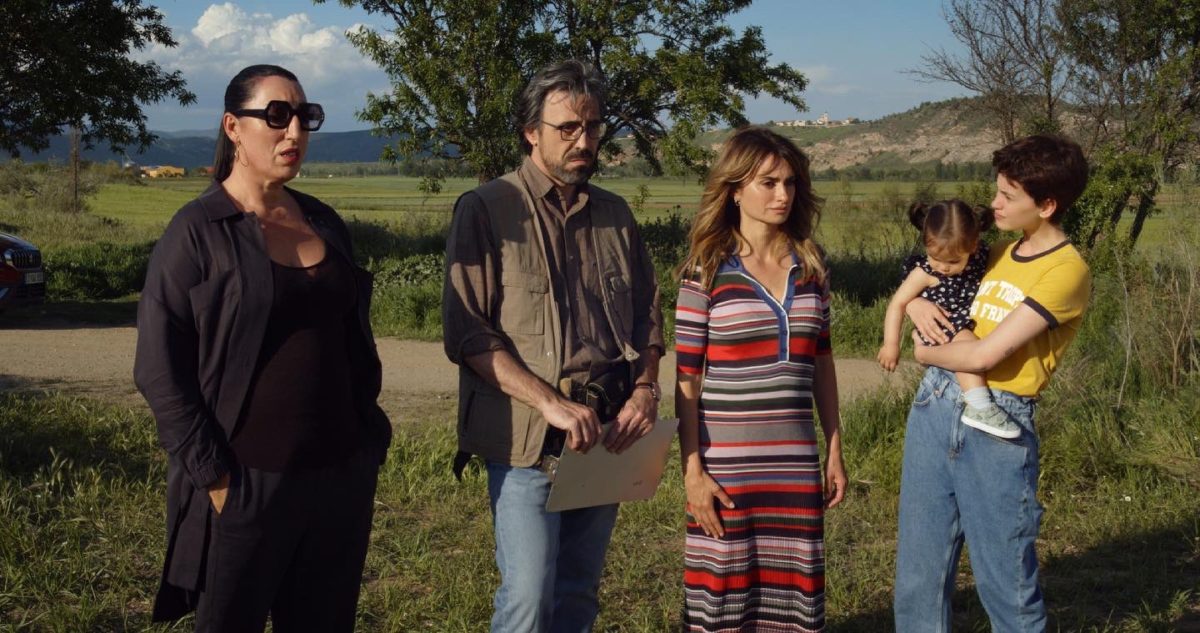
Making stops at Venice and NYFF, Pedro Almodóvar and Penélope Cruz’s latest collaboration, Parallel Mother, has earned much acclaim. While I was more mixed on Almodóvar’s blend of his customarily vibrant melodrama and excavating of Spanish history, there’s no denying each part works well on its own. David Katz said in his review, “Parallel Mothers is a film of promising ingredients sadly undercooked. It has that slightly stilted, over-heightened quality that characterizes Almodóvar’s weaker pictures, and, with a sting of disappointment, one can sense it from the opening ten minutes. There are tonal issues, awkwardly on-the-nose dialogue and plotting; the acting from leads Penélope Cruz and Milena Smit redeems matters with their expressive emotionality, and with the controlled discipline through which they put over their director’s convoluted writing.”
8. Flee (Jonas Poher Rasmussen; Dec. 3 in theaters)
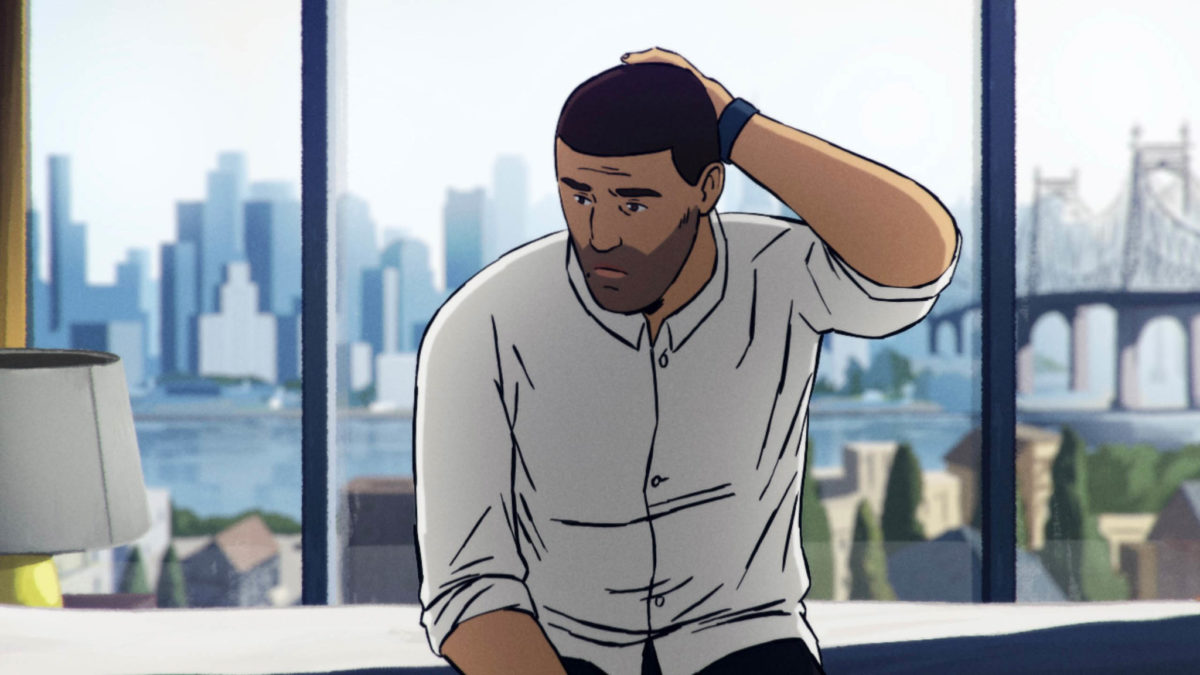
One of the most affecting films of 2021 comes in the form of animated documentary—a selection at Sundance, TIFF, Cannes, Telluride, NYFF, and BFI London. Christopher Schobert said in his review, “There have, of course, been a great many animated films about deeply serious subjects, many in recent years—Persepolis to Anomalisa to Waltz With Bashir. Jonas Poher Rasmussen’s Flee can now comfortably fit on this shelf of profoundly affecting films. Indeed, this 2021 Sundance Film Festival premiere ranks as one of the most uniquely memorable animated films of the last decade. It is remarkably successful as a study of the refugee experience, as a coming-of-age drama set against a backdrop of fear and danger, and as a tribute to one individual’s ability to survive and even flourish.”
7. France (Bruno Dumont; Dec. 10 in theaters)

From James Bond to films by Wes Anderson, Ildikó Enyedi, and Arnaud Desplechin, Léa Seydoux has had quite a year, but the performance to top them all comes in Bruno Dumont’s France. A sly media satire following a TV journalist whose privilege and class start to get untangled after she hits someone with her car, it’s an impressive work from the French director. David Katz said in his review, “His latest film France has the appearance of a glossy, luxe piece of entertainment––almost a French Succession––that could appeal to a wide, even non-cinephilic audience across its home country. But those familiar with his output can’t help scan the precis of this film and perceive a likely Trojan Horse, or a piece of subversion at cross-purposes with its exterior sense. Is this the regressive underside of auteurism, that secretly wants our favorites to make a recognizably similar film each time out the block?”
6. The Lost Daughter (Maggie Gyllenhaal; Dec. 17 in theaters and Dec. 31 on Netflix)

Coming at the tail end of this year is a film with significant pedigree. For her sensitive, affecting directorial debut, Maggie Gyllenhaal has adapted one of the most acclaimed writers working today, Elena Ferrante. The Lost Daughter also brings together quite a cast: Olivia Colman, Dakota Johnson, Jessie Buckley, Ed Harris, Peter Sarsgaard, Paul Mescal, Dagmara Dominczyk, and Alba Rohrwacher. As David Katz said in his review, “This might be one of the stronger directorial debuts––at least the most confident and forceful––by a known actress since Sarah Polley’s Away From Her. The Lost Daughter is also an adaptation of a slim text, that of newly-crowned (as in recently placed in the “canon”) Italian literary great Elena Ferrante; a novel of hers taking place in a carefully fashioned present-day timeline, adorned with a number of judicious flashbacks that help enrich our sense of the central character, but don’t make the text into a puzzle where past occurrences dully explain the present.”
5. Benedetta (Paul Verhoeven; Dec. 3 in theaters and Dec. 22 on VOD)
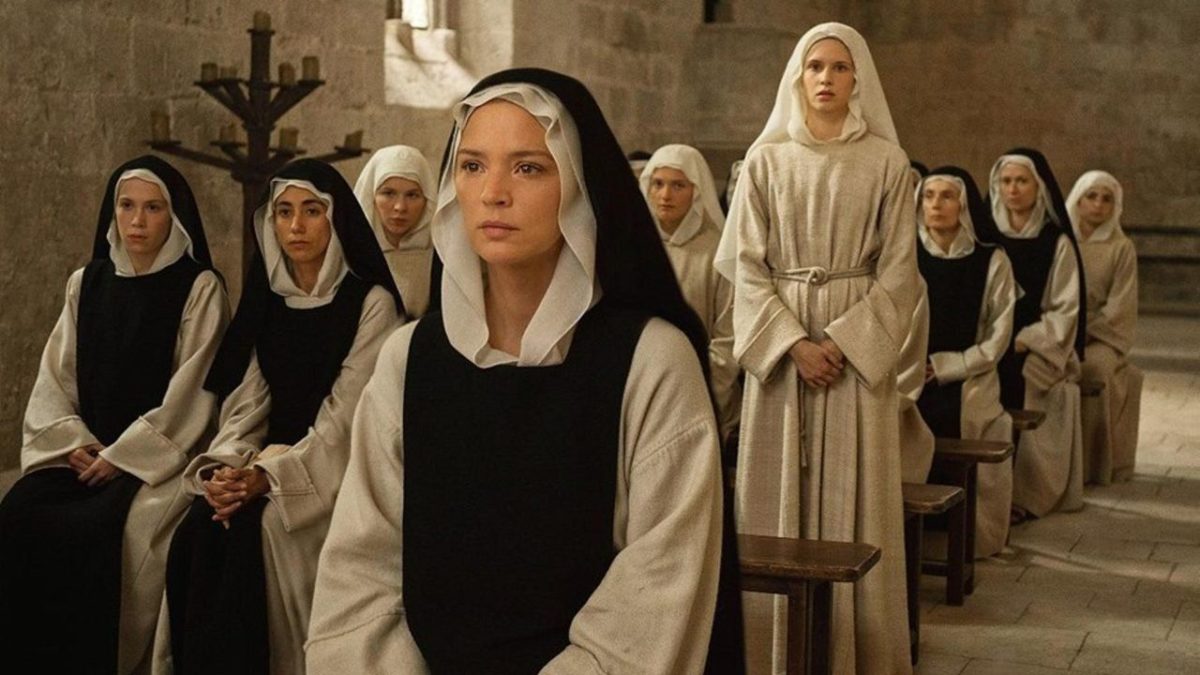
Five years after Elle, Paul Verhoeven is finally back with the perfect spiritual film for this Christmas season. Rory O’Connor said in his review, “Many of the best qualities of early and late Verhoeven combine in Benedetta, a tale of sex, blood, and sacrilege in 17th-century Italy. Based on the American historian Judith C. Brown’s 1986 non-fiction book Immoral Acts: The Life of a Lesbian Nun in Renaissance Italy (quite the title), its story focuses on the life of Benedetta Carlini, a nun in Precia who entered a sexual relationship with another woman in her convent. Paul Verhoeven originally adapted the book with his longtime collaborator Gerard Soeteman (Black Book, Turkish Delight), but the screenwriter stepped down when it became too “sexualized.” In the opening act there are not one, but two fart jokes. We are also, in many instances, offered evidence of the director’s well-founded appreciation for mommy’s milkies.”
4. West Side Story (Steven Spielberg; Dec. 10 in theaters)
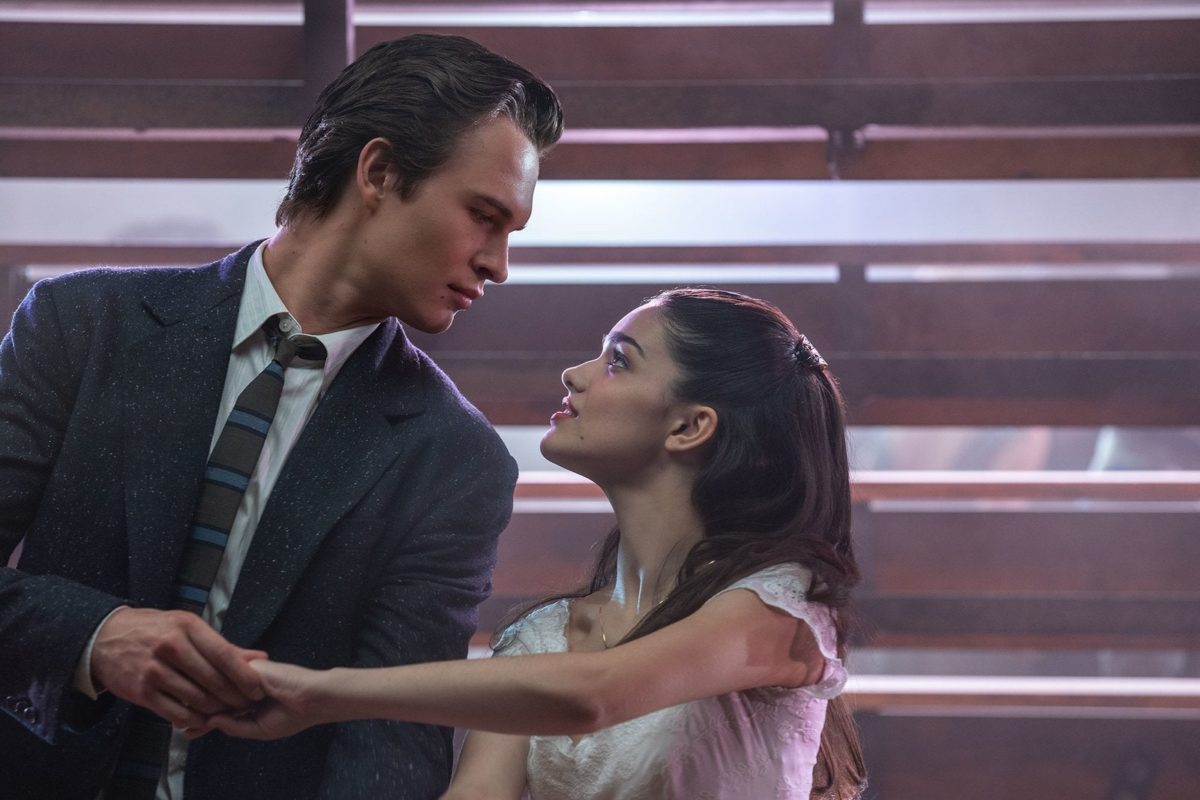
Marking one of the longest breaks between features during his prolific career, Steven Spielberg is returning this month with his Tony Kushner-scripted remake of West Side Story, delayed from a year prior due to the pandemic. Led by Rachel Zegler, Ansel Elgort, Ariana DeBose, David Alvarez, Mike Faist, Corey Stoll, and Brian d’Arcy James––and featuring a supporting turn by star of the 1961 original, Rita Moreno––the film is a rousing feat of reimagination. While there’s musicality in the rhythms of his half-century of work, seeing Spielberg take on a full-blown musical (and one of the most beloved, at that) is truly a spectacle to behold.
3. Red Rocket (Sean Baker; Dec. 10 in theaters)

In what will surely be his most divisive––and in my opinion, best––film, Sean Baker returns with Red Rocket. Giving one of the year’s finest performances, Simon Rex plays Mikey Saber, a down-and-out porn star returning to his small hometown in Texas as he attempts to seek redemption while getting in all sorts of other trouble. David Katz said in his Cannes review, “Texas City in Galveston County, Texas, in the summer of 2016. Mikey Saber (Simon Rex)—or Mike Davies, as he’d rather not be called—lopes off a greyhound bus into the broiling heat, covered in facial bruises, his possessions only a stale, dirt-caked sports bag thrown over his shoulder. This is no triumphant Odyssean homecoming, a prodigal son welcomed into the bosom of redemption. He is trouble: all devilishly good-looking male-model cheekbones and taut physique, whose real desire to please induces nothing but suffering to others and himself. This is his latest rodeo. “
2. The Matrix Resurrections (Lana Wachowski; Dec. 22 in theaters and on HBO Max)
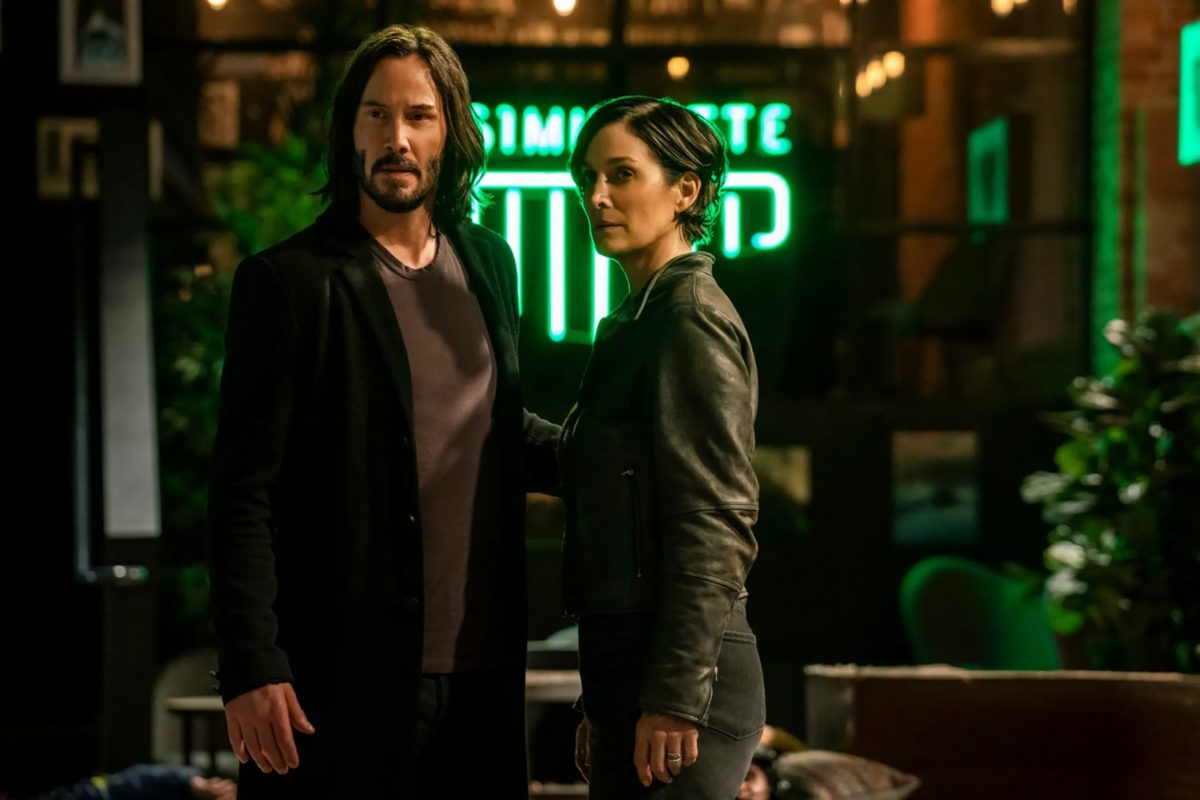
In terms of pure anticipation, there’s no studio film this year I’m more curious about than Lana Wachowski’s The Matrix Resurrections. With Reloaded and Revolutions holding up far better than anticipated on a recent rewatch—and, yes, the declining creativity of Hollywood blockbusters in the two decades since indeed makes them feel like rare artifacts—it looks like the fourth entry will steer this series in a far different direction. I simply can’t wait to see what’s in store.
1. Memoria (Apichatpong Weerasethakul; Dec. 26 in one theater)

At long last a new Apichatpong Weerasethakul film arrives, and while NEON’s one-theater-at-a-time release strategy will mean many won’t be able to see Memoria this month (or perhaps even the next few), the wait is worth it. David Katz said in his review, “Memoria is such a “musique concrète”-type film. It’s really about this quest, sometimes almost Tarkovskian––to put a certain sound in context, to be the mixing or mastering engineer of the roiling sounds in your soul. Tropical Malady and Syndromes and a Century become most pertinent as it moves on. There are two very distinct halves, the second helping clarify the sprawling, unanswered questions of the first, which also extend to an archeological excavation headed by Jeanne Balibar’s scientist character and a sweet, flirtatious sound engineer helping recreate Jessica’s sound artificially, as only she can hear it. “
Honorable Mentions
- The Hand of God (Dec. 3)
- Project Space 13 (Dec. 3)
- Try Harder! (Dec. 3)
- Agnes (Dec. 10)
- A Son (Dec. 10)
- The Novice (Dec. 17)
- President (Dec. 17)
